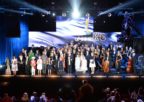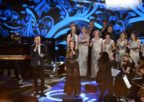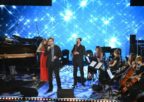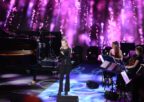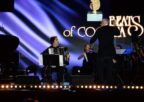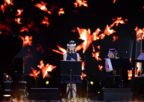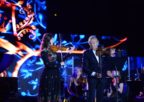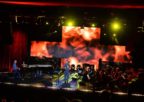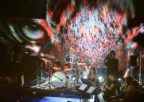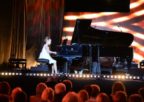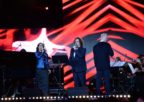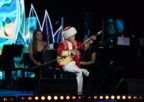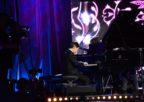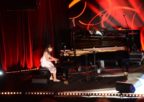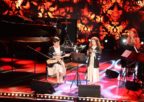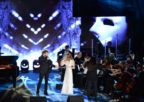“For years we have been able to observe the Institute’s patients for whom music provided invaluable support during rehabilitation. These observations motivated me to organize the International Music Festival for Children, Youths and Adults with Hearing Disorders “Beats of Cochlea,” recalled Prof. Henryk Skarżyński, the initiator of this event. This year we celebrated the fifth anniversary edition of this unique festival – which has already become a regular part of the music events calendar. The final concert, featuring former laureates and Masters with whom they worked on clinical workshops, acted as an opportunity to summarize everything that has happened during all five editions of the festival.
The anniversary concert had a unique character this year. The laureates of previous editions, who used to perform solo, appeared in duets with Masters – professional musicians who had previously run clinical workshops – as well as with orchestral accompaniment, therefore proving that they are capable of becoming an integral part of a professional music group and successfully perform on stage. And this sometimes poses difficulty even for music school students and graduates.
“This brings incredible joy and happiness to me as a doctor – seeing my patients perform on a big stage along with professional musicians. Today those patients are artists who have left the world of silence. It is also a proof for the magnitude of progress we have witnessed in medicine for the past few years,” said Prof. Henryk Skarżyński, welcoming guests gathered in the Palladium Theatre in Warsaw. “I would like to express my gratitude to physicians all over the world and doctors from the Institute of Physiology and Pathology of Hearing in Kajetany, who helped the participants of our Festival to regain good hearing, therefore allowing us all to admire them on stage today. The Festival has already risen to fame around the world. Many musically talented users of cochlear implants wish to come here. Nonetheless, it is a challenging Festival as we are not going easy on any of our participants and not everyone gets to play on the final concert. Our laureates must present a certain level of aptitude” emphasized Prof. Skarżyński. “Moreover, the Festival participants who arrive here from the farthermost parts of the world – including Australia, Asia or South America – send a message to the world about our scope of activities and our abilities. The Institute’s patients are the first to benefit from access to the latest technologies. I would also like to emphasize how those patients – through their wonderful performances – become ambassadors not only of our Institute, but also of the Polish medicine as a whole.”
While welcoming guests, Prof. Skarżyński gave special thanks to Polish composer Prof. Krzesimir Dębski, who has been involved in the Festival from the very beginning. “He is the good artistic spirit who always supports us,” the Professor said.
Prof. Ryszard Zimak – conductor, educator, many years’ rector of the Fryderyk Chopin University of Music in Warsaw and chairman of the jury – didn’t hide his emotions while recalling the first edition of “Beats of Cochlea”. “I accepted the invitation from Prof. Henryk Skarżyński to participate in this event with great joy but also with a certain amount of fear regarding the methods of evaluating deaf people who play instruments and sing. I wondered what type of criteria should be used. However, together with other members of the jury we came to a conclusion that, rather than evaluating, we were going to make choices, thus acting in accordance with Prof. Skarżyński’s words that every participant of this Festival is already a winner. After five years, seeing laureates of the first, second or third edition perform on stage in duets with professional musicians and symphony orchestra accompaniment, I realize I was wrong in some of my choices. Although it might seem only a small number of students from music academies are able to play in sync with an orchestra because it requires harmonic hearing, the laureates of previous editions did it just perfectly. The duets, which they created with some of the most remarkable performers, were truly of master quality. A tremendous progress can also be observed in their playing and singing techniques. In the latter, amazing work on their vocal pedagogy should be noted. I would like to express my deep respect for all participants because I know exactly what it takes to become a musician. People with cochlear implants who present us their music are heroes. I would love this noble initiative to spread across our country, across Europe and all over the world.” As Prof. Zimak emphasized – the fact that patients had the opportunity to perform those pieces of music on a big stage in such an outstanding manner is entirely to Prof. Henryk Skarżyński’s credit.
“This Festival was so unique because our patients, laureates of previous editions, stood on stage next to the Masters during the gala concert. They were performing with Polish artists and orchestral accompaniment,” said Barbara Kaczyńska, the artistic manager of the Festival and scientific secretary of the Medical Scientific Program “Music in the development of hearing in humans”, who couldn’t hide her emotions. “During the first edition of the Festival those participants who were distinguished by the jury had to perform solo. This evening, however, we could find out about their progress. It was a remarkable moment for both us and them.”
Krzysztof Malicki, the first flutist of the Warsaw National Philharmonic Orchestra, also expressed his admiration for the Festival’s organization – “I’m very impressed by the project organized by Prof. H. Skarżyński. He is both the heart and brain of this Festival. To me he is a true role model – I can’t help but admire his ability to unite people from various environments around him, the excellent example of which is the “Beats of Cochlea” Festival which allows us to appreciate the talents of people who were born deaf or lost their hearing and are now able not only to hear but also to sing or play instruments, thanks to Professor’s revolutionary treatment. As a member of the jury I must admit that it is not easy to choose the laureates, since the stories behind all participants’ performances are truly moving.”
“As a member of the jury who has already been observing the laureates for several years, I can say that they are constantly making bigger and bigger progress” commented Grzegorz Wilk – vocalist, actor and composer – therefore summarizing five editions of the Festival. “People who struggle with serious hearing problems, who use cochlear implants and actually should not be allowed to enter the stage – play music and sing. Is it not wonderful? Is it not motivating? I am very glad that Prof. Henryk Skarżyński invited me to take part in the first edition of the Festival because I find myself capable of motivating the participants to keep following this path,” said Grzegorz Wilk.
In regard to the participants’ skills, Vadim Brodski – a violin virtuoso and member of the Festival’s jury – brought attention to how important it is that a patient with hearing problems meets a truly passionate physician, such as Prof. Henryk Skarżyński. “I lost my hearing for three days once and was unlucky to be treated by a doctor with too harsh sense of humor, who told me: “So what that you don’t hear? Didn’t Beethoven also lose hearing?” The laureates were fortunate to receive more than just professional help and care in Kajetany, which is why they are now able to pursue their musical passions.”
In duet with the Master
The first duet announced by the concert gala presenters Agata Konarska and Maciej Miecznikowski, was formed by Weronika Niczyporuk and Grzegorz Wilk. They performed a song from “The phantom of the opera” musical which is known to have been a great Broadway hit for years. “Weronika picked the song. Although it is a rather difficult piece to perform, my stage partner transformed from a bashful girl to an amazing young woman who sings beautifully. I can see the incredible progress she has made,” recounted the famous singer and songwriter. “I attend singing classes twice a week. I also do vocal exercises at home for an hour everyday. The opportunity to perform in front of an audience gives me indescribable joy. During rehearsals Mr. Grzegorz was of much help to me, he shared many valuable tips with me. He was my Master, my teacher and a friend. When I stand on the crosswalk I feel afraid – but when I stand on stage next to Mr. Grzegorz, I feel safe” recalled Weronika Niczyporuk.
Prof. Janusz Olejniczak and dr Małgorzata Strycharz-Dudziak played together on the piano – they chose a nostalgic piece titled “Taniec Słowiański” composed by Antoni Dworzak, which put everyone in a reflective mood. “It is truly an honor for me to have played with the piano master. We wanted to present a piece that is both moving and pleasant to listen to. I played the lower tones and I am not sure if everything sounded right but I am certain that even an imperfect note can be beautiful.” concluded dr Małgorzata Strycharz-Dudziak who had already performed in the first edition of the Festival in 2015. “Mrs. Małgorzata told me her story. It seems completely surreal to me, similarly unbelievable to what the Professor has done for his patients – not only did he enable them to communicate with others but also to practice music. And they can do it in such a fine way, the example of which is this beautiful young woman whom I partnered on stage.”
The next piece chosen by master Krzysztof Malicki was no less romantic. It was a waltz composed by Wojciech Kilar for the “Trędowata” movie. He played it with Estera Łabiga, the laureate of the first edition of the Festival. “Mr. Krzysztof is a an excellent educator. I could already see that for myself during workshops with the Master on the preceding day. He gave me valuable advice and instructed me on the fashion in which certain phrases should be played. Throughout the concert he assisted me in “entering” on the right beat.”
The duet performance of Anna Czupryn, laureate of the third edition of “Beats of cochlea”, along with Vadim Brodski, a world famous violin virtuoso, was met with great enthusiasm from the audience. The fact that this pair has chosen to play “If I were a rich man” – a popular song from the “Fiddler on the roof” musical – made it all the more emotional. The performers received long ovations and the concert gala presenter Maciej Miecznikowski concluded that observing such a great Master made playing the violin seem so easy… “I really enjoyed playing with Mr. Vadim. The preparation of our performance and rehearsal with an orchestra went very smoothly, we understood each other well on stage and could both interpret each other’s musical intentions, so playing with Mr. Vadim brought me much joy. He is a very experienced violinist with terrific artistic achievements, which makes me incredibly grateful to him for the opportunity to play together, as well as for his many kind words and valuable advice. It was a truly pleasant experience and I will most certainly keep it in my memory,” said Anna Czupryn after the concert.
As one listened to a tenor opera singer Oliver Palmer and soprano singer dr Bogumiła Dziel-Wawrowska, it quickly became apparent how much talent it takes to sing “Vivo per lei” from the repertoire of Oliver’s favorite performer – Andrea Bocelli – in such an excellent manner. “When I enter the stage with Oliver I feel responsible for everything to go well. I get really emotional about it all, while Oliver keeps his composure and is always satisfied after the show. I envy him that attitude,” recounted dr Bogumiła Dziel-Wawrowska after the concert.
The duet created by mezzo-soprano singer Barbara Kaczyńska and a soprano artist cooperating with Music Theatre in Łódź, Bogumiła Dziel-Wawrowska, put the audience in a reflective mood. The artists sang a piece titled “Kołysanka nadziei” (lyrics by Barbara Kaczyńska) from the “Teatr instrumentalny. Sound design. Muzyczna terapia zmysłu słuchu” record. It is a unique album which contains music composed for people with hearing disorders, especially the ones who use cochlear implants – a project created by the Board of Music Therapy at the Institute of Physiology and Pathology of Hearing in Kajetany and released under the supervision of Prof. Henryk Skarżyński.
The big beat came along when the laureate of the Festival’s first edition Olaf Kaca entered the stage. Together with his master Wojciech Bylica they played “Eye of the Tiger” from the “Rocky III” picture. After that, the audience witnessed a fantastic show of accordion play by that evening’s special guest – Dejan Zivkovic – participant of the third edition of “Beats of Cochlea”. He performed the amazing “Libertango” composed by Astor Piazzolla and was followed by a big round of applause.
Musical performances of this year’s laureates
The anniversary evening also featured artistic presentations of ten laureates – participants of the Festival who made the biggest impression on the jury during earlier auditions. Among these laureates was the youngest participant – Mirei Pozas Saiz from Spain (her brother Arnau, the finalist of the Festival’s first edition, played Beethoven’s “Ode to joy” on saxophone in the European Parliament in 2018) who, with lovely charm of an 8-year-old, played on clarinet and performed… the shortest piece in the history of the Festival. “During those 30 seconds – because this is how long her presentation took – I found myself completely captivated by her play,” said Maciej Miecznikowski about Mirei just after the jury deliberation.
“I think of implants as my jewellery” said another young artist before the show – a 9 years old Salome Daghundaridze from Georgia – who decided to take part in the Festival for the second time. Salome admitted she loved music because her mother used to sing her lullabies. She adores Elton John. The audience also welcomed some brilliant 11 years old pianists: Anamaria Stefania Nastase from Romania who considers playing the piano to be much more than just a form of therapy, her age-mate Abay Nurlanuly from Kazakhstan who, apart from playing the piano, is also keen on drawing, swimming and playing chess who conquered the hearts of those in audience by performing Siergiej Rachmaninow’s “Italian polka”. The girl explained that she could grasp the meaning of the word “silence” only after she had received her cochlear implant and had been able to hear the singing of birds, the rustle of trees and people’s conversations.
An 11-year-old Nurbol Seydulla from Kazakhstan dressed in a folk costume also won the listeners’ hearts. He played one of his national melodies on a traditional Kazakh instrument called Dombra which has only two strings. Another applauded artist was a 23 years old trombone player Alek Mansouri from USA. This incredibly lovable young man stated that he had never thought of himself as a deaf person and his trombone is extraordinary because, if played correctly, the instrument… sings. A round of warm applause was also given to the 65 years old Bettina Gellinek Turner from USA who played on a baroque flute and decided to perform Sonata in F Major by George F. Handel – a piece well known to all flute players.
The Palladium Theatre scene also welcomed some vocalists. Lova Rose Rohrmann Heick from Denmark, only 13 years of age, proved she was an already mature artist by performing “Lost Boy”. As her father recalled, Lova started singing when she was only 2.5 years old. The Institute of Physiology and Pathology of Hearing was represented by 26 years old Paweł Sepioło, who – along with his wife Agnieszka – gave an emotionally stirring performance by singing a popular melody “Weź nie pytaj” from Paweł Domagała’s repertoire. Since Paweł has recently lost hearing in one of his ears, the song in his interpretation has taken a whole new meaning.
As usually, the end of the Festival was celebrated by a brilliant duet – Barbara Kaczyńska (mezzo-soprano) and Maciej Miecznikowski (baritone) who performed “Świat, który słyszę” – a song composed by maestro Krzesimir Dębski with lyrics written by Prof. Henryk Skarżyński in 2015. Basia and Maciej sing this every year, therefore it has become the anthem of the Festival. All artists were accompanied by Elżbieta Ostrowska’s Divertimento Chamber Orchestra conducted by Krzesimir Dębski.
“Thanks to those who entered or returned to the world of sound, we have the opportunity to experience some beautiful moments together, which allow us to discern the great variety of possibilities lying within each one of us” – these words spoken by him during the first edition of the “Beats of Cochlea” Festival are an excellent summary of this extraordinary event.






